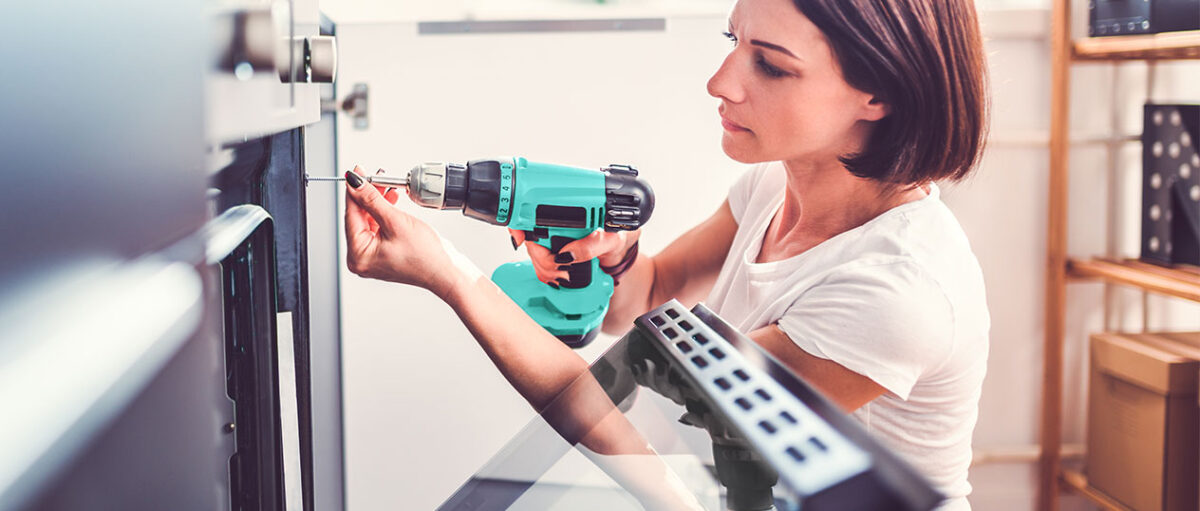Home prices these days can be daunting. So, you may be asking yourself “Should I buy a fixer-upper?” to save more money upfront. But is it a good investment in the long run? Let’s find out.
In this blog:
- Why should I buy a fixer-upper?
- Why should I NOT buy a fixer-upper?
- How to finance a fixer-upper
Why should I buy a fixer-upper?
If you’ve got your heart set on a specific location, being open to fixer-uppers could greatly improve your chances of finding an available home in a place you love. In a competitive market, you may also have a better chance of winning the bid if you’re willing to finance repairs yourself, rather than including a contingency clause* requiring the seller to cover it.
Fixer-uppers also generally come with lower purchase prices, so you could save on your down payment if you choose a home that needs some TLC. Just keep in mind that the cost of repairs could outweigh the initial savings.
One of the biggest perks of buying a fixer-upper is the ability to renovate to taste. If you have a specific vision for the kind of home you’d like to create but aren’t ready to commit to a new build, this could be a great option for you. But remember, every vision needs a budget.
*Contingency clauses in your offer allow you to walk away with your earnest money (a deposit made to the seller that assures the purchase agreement is reliable) if the seller doesn’t meet the outlined conditions.
Why should I NOT buy a fixer-upper?
When it comes to home repairs, you often discover new issues as you go about repairing the ones you planned for. There’s a lot that could go wrong in a home, so make sure to budget for unexpected costs.
Renovations can also take time to complete, so even when you’ve closed on your loan and gotten the keys, it may be months before you can really start to settle into your new home. Most renovation loans also require repairs to be completed in a certain amount of time, so delays can cause added stress to your mortgage experience.
Financing a fixer-upper can also be more complicated than a standard mortgage. Renovation loans can help simplify the process, but you’ll still have to consider finding a contractor, how the funds will be distributed to them, the projected appraisal value of the home after repairs are completed, and more.
How to finance a fixer-upper
Good news! You have options when it comes to financing a fixer-upper. FHA 203(k) loans and Fannie Mae HomeStyle® Renovation loans are two of the most popular choices. So, how do they stack up?
FHA 203(k)
You may have heard of a standard FHA loan. While FHA 203(k) loans are also backed by the Federal Housing Administration, there are some key differences. FHA 203(k) offers two programs depending on how extensive your financing needs are: Standard and Limited.
Standard: For structural and non-structural repairs.
- Single loan for home purchase and renovation costs
- Available for primary residences only (your permanent address)
- Down payments as low as 3.5%
- No maximum repair costs
- Minimum $5,000 repair costs
Limited: For minor remodeling and non-structural repairs.
- Single loan for home purchase and renovation costs
- Available for primary residences only (your permanent address)
- Down payments as low as 3.5%
- $35,000 maximum repair costs
- No minimum repair costs
Fannie Mae HomeStyle
If your planned renovations include additions that aren’t strictly necessary for the livability of the house (like a swimming pool), those won’t be covered by an FHA 203(k) loan. In this case, you may want to consider a Fannie Mae HomeStyle renovation loan. Since this loan type is not government-backed, it offers more flexibility in terms of the repairs allowed and the types of homes that qualify.
- Renovation costs and mortgage can be bundled into one monthly payment
- Available for primary residences, second homes, condos, and manufactured homes
- Down payments as low as 3%
- Finance repairs up to 75% of the home’s post-reno value
Is there anything else I need to know about buying a fixer-upper?
So, should you buy a fixer-upper? If you want more control over the look and feel of your new home, it could be a great choice for you. While renovations can get pricey, specialized mortgages like FHA 203(k) and Fannie Mae HomeStyle can help you get a lower interest rate than a separate loan paired with a conventional mortgage. Bottom line, it comes down to how much time and energy you want to spend budgeting for and implementing repairs. If you’d rather keep your home loan process as simple as possible, a move-in ready home may be a better fit. Either way, we’re here to help.
Rehabilitating a fixer-upper can be rewarding, but there’s a lot of hard work, planning, and budgeting involved, too.




